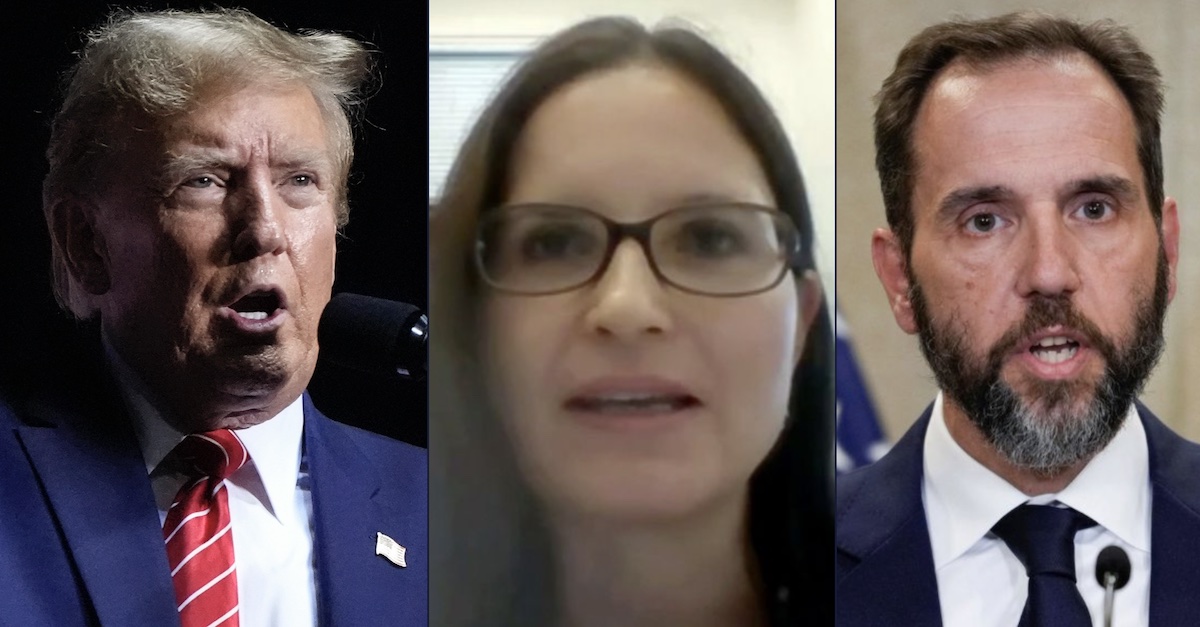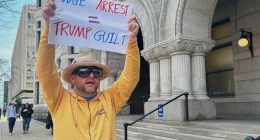
Left: Donald Trump (AP Photo/Mike Stewart, File); Center: U.S. District Judge Aileen Cannon (U.S. Senate); Right: Special counsel Jack Smith (AP Photo/J. Scott Applewhite, File)
The judge overseeing former President Donald Trump’s Mar-a-Lago documents case was advised by two other federal judges not to take the case, according to a new, anonymously-sourced report.
U.S. District Judge Aileen Cannon was randomly assigned to oversee the 45th president’s documents case in the Southern District of Florida. When that assignment came down, however, the Southern District’s Chief Judge Cecilia M. Altonaga and an unidentified judge advised her to pass, according to “two people briefed on the matter,” The New York Times reports.
Cannon allegedly ignored those entreaties.
Here’s how the paper of record described its sourcing:
The two people who discussed the efforts to persuade her to hand off the case spoke on the condition of anonymity to discuss the matter. Each had been told about it by different federal judges in the Southern District of Florida, including Judge Altonaga.
Neither of the people identified the second federal judge in Florida who had reached out to Judge Cannon. One of the people confirmed the effort to persuade Judge Cannon to step aside but did not describe the details of the conversations the two judges had with her. The other person offered more details.
The unidentified judge was reportedly the first to reach out to the controversial, Trump-appointed jurist, according to the Times.
In seeking to dissuade Cannon, the first judge allegedly suggested a judge closer to the Southern District’s main, much busier courthouse in Miami take the case. Cannon sits in Fort Pierce — the lone judge in the provincial courthouse located some 130 miles north of Miami.
Without saying so directly, the Times report seems to suggest the unidentified judge offered two knock-on reasons for a Miami-adjacent judge to take Cannon’s place at the helm of the high-profile case.
For one, the grand jury empaneled by special counsel Jack Smith conducted its work out of the Miami location. Second, the Miami courthouse was already outfitted with a secure facility for receiving, storing, and handling the sorts of classified documents alleged to be at the heart of the prosecution against the former president.
“When she was assigned to the case, the courthouse in Fort Pierce did not have a secure facility,” the Times report reads. “Because Judge Cannon kept the case, taxpayers have since had to pay to build a secure room — known as a Sensitive Compartmented Information Facility, or S.C.I.F. — there.”
But that alleged argument failed to convince. Next up was Altonaga, according to the Times. The chief judge was reportedly more blunt.
“It would be bad optics for Judge Cannon to oversee the trial because of what had happened during the criminal investigation that led to Mr. Trump’s indictment on charges of illegally retaining national security documents after leaving office and obstructing government efforts to retrieve them,” the paper reports — paraphrasing what Altonaga allegedly said.
That earlier kerfuffle involved Cannon’s highly-criticized appointment of a special master in response to the FBI’s August 2022 raid on Trump’s Palm Beach estate. Not yet a defendant, Trump sued later that same month, asking for the court’s protection to hash out attorney-client privilege issues with the documents recovered through the search-and-seizure warrant. Smith appealed the special master ruling, an appellate court sharply rebuked Cannon, and the district court was forced to dismiss the lawsuit in December 2022.
When charges were filed in June 2023, the case could have gone to any judge sitting in West Palm Beach, Fort Lauderdale or Fort Pierce.
The lottery system turned up Cannon’s number.
Then came the professional suggestions to let it go.
In each instance, the judges in question reportedly spoke to Cannon and tried to get her off the Mar-a-Lago case during phone calls.
During each alleged phone call, Cannon rebuffed those suggestions.
Law&Crime reached out to the U.S. District Court for the Southern District of Florida for comment on this story. A court spokesperson directed us to email our inquiry after hearing the question over the phone. No substantive response was immediately forthcoming at time of publication.
Have a tip we should know? [email protected]








